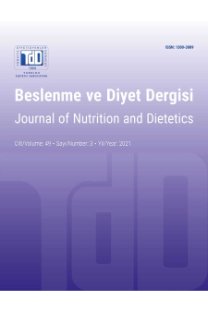Nefrotik Sendrom ve Tıbbi Beslenme Tedavisi
Vücuttan aşırı protein kaybı ile karakterize bir durum olan nefrotik sendrom organizmada pek çok defekte nedenolabilmektedir. Nefrotik sendromun tedavi edilememesi ile birlikte de geri dönüşümsüz böbrek yetmezliğine neden olarak,ilerleyen dönemde bireyin hayatını tehlikeye sokacak sağlık sorunlarının yaşanmasına yol açabilmektedir. Proteinüri, ödemve köpüklü idrar nefrotik sendromun sıklıkla görülen belirtileri arasındadır. Nefrotik sendromun tedavisi tıbbi beslenmetedavisi, tıbbi tedavi, immün sistem baskılayıcı tıbbi tedavi kullanılarak yapılabilmektedir. Nefrotik sendromlu hastalardaprogresif böbrek yetmezliğinin önlenebilmesi için tıbbi beslenme tedavisinin önemi büyüktür. Nefrotik sendromluhastalarda azot dengesinin korunabilmesi için yeterli enerji vermek önemlidir. Yine kas kaybının ve malnütrisyonunönlenebilmesi, proteinürinin dengelenebilmesi açısından da yeterli protein sağlanmalıdır. Nefrotik sendromda görülenkomplikasyonlarından birisinin de hiperlipidemi olması nedeni ile diyet yağının tür ve miktarının da önemli olduğuvurgulanmaktadır. Sonuç olarak, tedavi edilemediği takdirde böbrek yetmezliğine neden olabilecek nefrotik sendromunkontrol altında tutulmasında tıbbi beslenme tedavisinin öneminin büyük olduğu düşünülmektedir. Bu derleme ile denefrotik sendromda tıbbi beslenme tedavisinin açıklanması amaçlanmıştır.
Nephrotic Syndrome and Medical Nutrition Therapy
Nephrotic syndrome, a condition characterized by excessive protein loss from the body, can cause many defects in the organism. With not to treat nephroticsyndrome, it can lead to irreversible renal failure and may lead to health problems that may endanger the life of the individual in the later period. Proteinuria, edema, foamy urine are common symptoms of nephrotic syndrome. Thetreatment of nephrotic syndrome can be done by medical nutrition therapy, medical treatment, and immunosuppressive medical treatment. Medical nutrition therapy is of great importance for preventing progressive renal failure in patients with nephrotic syndrome. In patients with nephrotic syndrome, it is important to give enough energy to maintain the nitrogen balance. Adequate protein should be provided in order to prevent muscle loss and malnutrition and to balance proteinuria. Since one of the complications of nephrotic syndrome is hyperlipidemia, it is emphasized that the type and amount of dietary fat is also important. In conclusion, medical nutrition therapy is considered to be of great importance in the control of nephrotic syndrome which may cause kidney failure unless it can be treated. The aim of this review is to explain the medical nutrition therapy in nephrotic syndrome.
___
1. Schwarz A. New aspects of the treatment of nephrotic syndrome. J Am Soc Nephrol 2001;12:44-7.2. National Kidney Foundation. Available at: https: //www. kidney. org/ atoz/ content/ nephrotic Accessed December 12, 2018.
3. Richard PH, Goldsmith DJA. Nephrotic syndrome in adults. BMJ 2008;336:1185-9.
4. Nishi S, Ubara Y, Utsunomiya Y, Okada K, Obata Y, Kai H, et al. Evidence-based clinical practice guidelines for nephrotic syndrome. Clin Exp Nephrol 2016;20:342-70.
5. Schwarz A. New aspects of the treatment of nephrotic syndrome. J Am Soc Nephrol 200112:44-7.
6. Molfino A, Don BR, Kaysen GA. Nutritional and nonnutritional management of the nephrotic syndrome. In:Kopple J,Massry S, Kalantar Zadeh K,editors. Nutritional Management of Renal Disease. 3rd ed. Academic Press; 2013. p. 393-413.
7. Kaku Y, Ohtsuka Y, Komatsu Y. Clinical practice guideline for pediatric idiopathic nephrotic syndrome: General Therapy. Clin Exp Nephrol 2015;19(1):34-53.
8. Richard PH, Goldsmith DJA. Nephrotic syndrome in adults. BMJ 2008;336:1185-9.
9. De Seigneux S, Martin P. Management of patients with nephrotic syndrome. Swiss Med Wkly 2009;139:416-22.
10. Lim VS, Wolfson M, Yarasheski KE. Leucine turnover in patients with nephrotic syndrome: evidence suggesting body protein conservation. JASN 1998;9(6):1067-73.
11. Maroni BJ, Staffeld C, Young VR. Mechanisms permitting nephrotic patients to achieve nitrogene quilibrium with a protein-restricted diet. ASCI 1997;99(10): 2479-87.
12. Javanbakht MH, Sadria R, Djaali M. Soy protein and genistein improves renal antioxidant status in experimental nephrotic syndrome. Nefrologia 2014;34(4):483-90.
13. Tovar AR, Murguı´a F, Cruz C, Herna´ndez-Pando R, Aguilar-Salinas CA, Pedraza-Chaverri J, et al. A soy protein diet alters hepatic lipid metabolism gene expression and reduces serum lipids and renal fibrogenic cytokines in rats with chronic nephrotic syndrome. J Nutr 2002;132: 2562–69.
14. Bagga A. Revised guidelines for management of steroid-sensitive nephrotic syndrome. Indian J Nephrol 2008;18(1):31-9.
15. Bell S, Cooney J, Packard JC. Omega-3 fatty acids improve postprandial lipaemia in patients with nephrotic range proteinuria. Atherosclerosis 2009;205:296–301.
16. Eknoyan G. KDIGO Clinical practice guideline for glomerulo nephritis. Official Journal of the International Society of Nephrology. Available at: http://www.kidneyinternational.org Accessed September 25, 2018.
17. Nishi S, Ubara Y, Utsunomiya Y, Okada K, Obata Y, Kai H, et al. Evidence-based clinical practice guidelines for nephrotic syndrome. Clin Exp Nephrol 2016;20:342-70.
18. Mishra OP, Gupta AK, Prasad R. Antioxidant status of children with idiopathic nephrotic syndrome. Child Nephrol Urol 2011;26: 251-56.
19. Bulucu F, Vural A, Aydin A, Sayal A. Oxidative stress status in adults with nephrotic syndrome. Clin Nephrol 2000;53(3):169-73.
20. Kodner C. Nephrotic syndrome in adults: Diagnosis and management. Am Fam Physician. 2009;80(10):1129-34.
21. Hull RP, Goldsmith DJA. Nephrotic syndrome in adults. BMJ 2008;336:1185-89.
22. Dorhout Mees EJ. Does it make sense to administer albumin to the patient with nephrotico edema? Nephrol Dial Transplant 1996;11:1224-26.
23. Remuzzi G, Benigni A, Remuzzi A. Mechanisms of progression and regression of renal lesions of chronic nephropathies and diabetes. J Clin Invest 2006;116(2):288-96.
24. Stachowski J, Barth C, Michalkiewicz J, Krynicki T, Runowski D, Lewandowska-Stachowiak M, et al. Th1/ Th2 balance and CD45-positive T cell subsets in primary nephrotic syndrome. Pediatr Nephrol 2000;14:779-85.
- ISSN: 1300-3089
- Yayın Aralığı: Yılda 3 Sayı
- Başlangıç: 1972
- Yayıncı: Türkiye Diyestisyenler Derneği
Sayıdaki Diğer Makaleler
Böbrek Hastalıklarında Beslenme Durumunun Saptanması
Kronik Böbrek Yetmezliği: Olgu Sunumu
Böbrek Hastalıkları ve Mikro Besin Ögeleri
Böbrek Hastalıkları ve Karbonhidrat Metabolizması
Nefrotik Sendrom ve Tıbbi Beslenme Tedavisi
Böbrek Hastalıkları ve Lipit Metabolizması
Renal Replasman Tedavisi Alan Yetişkin Hastaların Tıbbi Beslenme Tedavisi: Bir Olgu Sunumu
Yoğun Bakımda Akut Böbrek Yetmezliği Olan Yetişkin Olgu Sunumu
Son Dönem Böbrek Yetmezliğinde Tıbbi Beslenme Tedavisi
